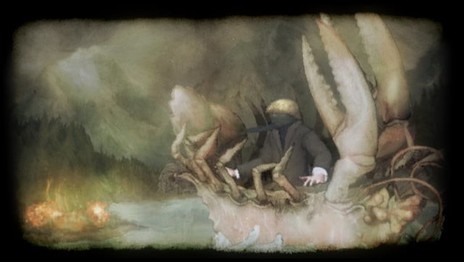AudioCulture
The noisy library of New Zealand music
Te pātaka korihi o ngā puoro o Aotearoa
The Upbeats
aka Downie Wolf and Terror Snake, Crushington
From the moment they arrived through their storied residency at Valve (now Valhalla), they brought a new energy that audiences almost instantly responded to.
In 2004, The Upbeats released their energetic first 12" vinyl double-single ‘Slit’ / ‘Fill Me In’ through BC Recordings in the UK, following it up later that year with a self-titled debut album for Loop. Close to 20 years later, their exploits have taken them around the world more times than they can count, permanently etching their names into the international drum & bass history books.
Mysteries of Funk
In 1997, Wellington’s underground dance music scene was in the midst of a golden run of all-ages inner city warehouse parties. That year, Glenn arrived in Wellington from Nelson by way of Tauranga to finish his secondary education at Wellington High School, where he met Jones in maths class. The two quickly found common ground over their love of bodyboarding, beaches, skateboarding and music.
Glenn had already been introduced to the futuristic sounds of UK jungle/drum & bass through some Scandinavian snowboarders who visited his dad in Nelson in the mid-1990s. Not long after, his mother gave him a copy of one of the genre’s first internationally visible compilation albums, Metalheadz Platinum Breakz, as a Christmas present. As he told the Insomniac website in 2015, “I listened to it, thought it was boring, took it back, and swapped it for Pearl Jam.”
However, by the time he was at high school with Jones, he had changed his tune. Captivated by breakbeats, basslines, and sci-fi samples, Glenn spent his weekends in local record stores looking for UK drum & bass albums like Mysteries of Funk by Grooverider, Roni Size/ Reprazent’s Mercury Prize-winning New Forms, and Aphrodite and Mickey Finn’s jump-up records.
At first, Jones was resistant to the electronic music Glenn was digging.
At first, Jones was resistant to the electronic music Glenn was digging. “He just wanted to listen to [alt-rock groups like] Soundgarden,” Glenn laughed. “It was the nineties,” Jones intoned. “The actual nineties.” Things changed when Glenn’s mother purchased a PC computer for the family. “Our friend Joe Garlick gave me a cracked copy of a music production program called Cakewalk, a few samples, and maybe an early copy of FL Studio [then known as Fruity Loops],” he continued.
Once Jones started visiting and trying to make electronic music with Glenn, his opinions shifted. Using software reminded him of something else he enjoyed doing: playing video games. “I definitely got pretty hooked on it,” Jones said. “It was like cracking a code.”
After they finished high school, Glenn moved down to Nelson to complete an introductory IT course. While living in the South Island, he became frustrated with the lack of drum & bass music available on CD and began buying 12" vinyl records intended for DJ use. Word got around town about his collection, and he found himself DJing at local outdoor parties and Nelson’s key all-ages music and arts performance space during those years, The Artery.
Given his interest in computers, Glenn found his way onto the internet, where he began learning about the international world of drum & bass via the Dogs On Acid message board. He also used the internet to stay in contact with Jones, share rudimentary song sketches, and keep abreast of appearances by visiting DJs from the UK. Between 1999 and 2001, Glenn travelled to Wellington regularly to attend dance parties organised by leading local crews of the era, like Bass Frontiers.
“Leading up to the end of my Nelson stay in 2001, I ran the local radio station for The Gathering,” Glenn remembered. “I was in there doing shows regularly and trying to figure out a broadcast schedule.”
Drum & Bass Tuesdays
In 2002, Jones and Glenn moved into a flat in Wellington and spent hours a day working on music together. They also teamed up with their DJ friends Sift, Lenny Keys, and Roy Darke and launched a weekly drum & bass night on Tuesdays at Valve (now Valhalla) on Vivian Street. Promoting a residency allowed them to hone their skills as DJs, but as Glenn said, “It was also a really important testing ground for the music we were starting to produce as The Upbeats.”
With gold coin entry and drink specials, Drum & Bass Tuesdays was a hit with university students. It quickly became one of the most popular club nights in the city. As word spread, visiting DJs from around the country and overseas began to make special appearances there. In stark contrast to the dark, neurofunk sound and all-black dress code of drum & bass at the time, The Upbeats played bootleg remixes of songs like ‘Intergalactic’ by Beastie Boys and ‘The Final Countdown’ by Europe. They also made a habit of dressing up in colourful outfits and performing with great delight and enthusiasm.
as Drum & Bass Tuesdays took off, the global sound of D&B underwent a significant shift.
Serendipitously, as Drum & Bass Tuesdays took off, the global sound of drum & bass underwent a significant shift. Following the rise of Brazilian producers and DJs such as Marky, who recorded the top 20 UK bossa nova drum & bass hit ‘LK (Carolina Carol Bela)’ with XRS and Stamina MC, the music became a bit more fun and free. As Glenn put it, “We were really excited about that, so we recorded ‘Psyesta’.”
A slice of sunshine drum & bass amplified by flamenco guitar parts, ‘Psyesta’ captured the imagination of the student radio network and brought The Upbeats into the broader New Zealand music industry. Between 2002 and 2003, they remixed ‘Tour Of Outer Space‘ for the dub’n’bass group Rhombus and contributed several early tracks, including ‘Deep Breath’, ‘Us Hermits’ and ‘Psyesta’ to CD compilations compiled by Christchurch’s Fabel Music and Loop in Wellington. Thinking back, The Upbeats cite James Meharry, aka Pylonz from Fabel Music and the drum & bass MC Mana as some of their first real champions. “They were incredibly supportive,” Glenn said.
Having been active on online drum & bass message boards such as Dogs On Acid and the local Bassdrop site, The Upbeats were clued up on how to send their music to their heroes in the UK and Europe. One of the first major figures who responded to them was Steve Carr, aka Digital, who was tearing up the global scene with his hard breaks and dubby basslines. “Being an absolute legend, he sent us a DVD filled with his breakbeat sample library and said, ‘Look, you’ve got something, but your drums are shit, focus on breakbeats,’” Glenn said.
Taking off
After taking Carr’s advice to heart, The Upbeats came to the attention of Vegas and Maldini from Bad Company UK, who released their breakout double-single ‘Slit’/‘Fill Me In’ through BC Recordings in 2004. The Upbeats’ space-aged dance tracks were futuristic and funky. More importantly, they had basslines that sounded thunderous on nightclub sound systems. From the moment Vegas and Maldini started DJing acetate dubplates of them on tour, ‘Slit’ and ‘Fill Me In’ turned heads.
In 2015, Glenn explained the full story to the Insomniac website: “We signed some music to this really dodgy Puerto Rican dude who spun this amazing story about setting up this label and how great it was going to be. Nothing happened, but Vegas and Maldini were playing in Puerto Rico and were at this house party in a jacuzzi where someone was DJing one of our songs. Maldini asked about it, and word got back to us. A couple of weeks later, they were playing in Wellington, and I gave them a CD. The following week, I got a message from them saying, ‘We want to sign you.’”
In 2004, The Upbeats also signed their self-titled debut album to Loop for release in New Zealand. It was awarded four stars by The Dominion Post and named their album of the week. SmokeCDs.com was equally effusive with their praise: “This is cutting edge music by artists unafraid of turning a blind corner – their debut is a celebration of music, and no one should be left untouched by that. Highly recommended.”
Until then, The Upbeats had presented their music through DJ sets. However, to celebrate the album, they held a “live” performance at Wellington’s Indigo Bar (now San Fran) that consisted of Glenn DJing, Jones playing bass guitar, and the vocalist Jess Chambers, who sang on several songs on the album. The performance was rough and ready, but it contained the seed of an idea The Upbeats would explore further later.
To The World
By the time Loop had released The Upbeats in New Zealand near the end of 2004, seven tracks featured on the album had been signed to several respected drum & bass record labels from the UK, US, and Germany, Timeless Recordings, Vicious Music Group, Incite Recordings and Hostile Recordings, and Protogen Recordings.
In 2005, Bad Company UK offered them an album deal with their BC Recordings label. “We spent our advance going to Europe for three months,” Jones recalled. They DJed for promoters across Europe, often forsaking hotel rooms to sleep on promoter’s couches or floors. “It was a formative experience,” Glenn said. “This was all so long before the professional era of drum & bass. Even the guys who were the absolute icons of the scene at the time were playing at some very ad hoc parties.”
For their first European tour, The Upbeats worked with Caroline Kakoo from Unique Artists, Vegas and Maldini’s booking agent at the time. “There were no smartphones back then,” Glenn said. “We were using printed tour itineraries and physical maps.” “I found my diary from back then the other day,” Jones continued. “It was full of promoter phone numbers and directions for how to get places from the train stations.”
They were given a set of Mackie studio monitor speakers that helped them hone their sound.
Between shows, The Upbeats stayed with Vegas and Maldini, who continued to house them in the UK on every subsequent trip for the next four or five years. They also gave them a set of Mackie studio monitor speakers that helped them hone their sound. “We used those monitors to write some important songs,” Jones said. Importantly, The Upbeats also solidified their relationship with the Dutch drum & bass trio Noisia on that first tour. “They became a very, very big part of our ongoing career,” Glenn said.
Over the following years, The Upbeats regularly DJed across Europe, the UK, North America, Asia, Australia, and sometimes South America, often racking up over 100 shows in 12 calendar months. Between overseas stints, they would tour New Zealand, play local summer festivals, and make plans with their manager at the time, Sharon Goodall, who Glenn describes as “an absolute legend.”
When they were off stage, The Upbeats stayed busy in the studio recording singles for an ever-growing and ever-impressive list of drum & bass labels, including Renegade Hardware, Subtronix, Virus Recordings, Soul:r, Subtitles, Samurai Music, Commercial Suicide, Vision Recordings, and their own Non Vogue label. Every few years, they’d feel like they had enough material to release an album as well.
Nobody’s Out There / Big Skeleton
In 2007, The Upbeats unveiled their second album, Nobody’s Out There, through BC Recordings. On release, they supported it with an expanded live show featuring The Upbeats playing hardware and instruments alongside live vocals from Sydney singer-songwriter Georgie Fisher and the longstanding UK drum & bass legend MC Lowqui. Fisher and Lowqui were so committed to what The Upbeats were doing that they temporarily relocated to Wellington to perform with them regularly.
In 2009, The Upbeats released their third album Big Skeleton through their own Non Vogue label. In many ways, they were following in the footsteps of New Zealand drum & bass producers and DJs Concord Dawn and Bulletproof, although The Upbeats felt they spent the decade winging it. “We didn’t really plan a lot then,” Jones said. “The way we were doing things was pretty ad hoc.”
Looking back, however, you can impose a semblance of logic on what they were doing. Releasing 12" vinyl singles on overseas labels and getting co-signs from the right DJs and producers were the key tools that propelled them forward in their overseas touring efforts, but back home in New Zealand, it was all about the album. “There was a local infrastructure that really supported you when you released an album,” Glenn said. “All the student radio network stations lapped it up, and there were a lot of media outlets we could do interviews with. You could base a whole national tour off it.”
Close Calls
In the 2000s, the New Zealand drum & bass scene was strong, but audiences started to jump on new club sounds like dubstep and trap EDM as the decade ended. Although they were able to adapt to the shift by producing and DJing dubstep under the alias Crushington, The Upbeats found themselves wondering if their musical careers were coming to an end. “There was a turning point when we hit our thirties where we had to sit down and figure out what we were really doing,” Glenn said. “There were some close calls along the way as far as The Upbeats carrying on,” Jones added.
In 2012, they received the first of several meaningful affirmations when local festival favourites, the legendary New Zealand jungle/drum & bass/heavy soul band Shapeshifter, approached them about co-producing and engineering their seventh album, Delta (2013). The Upbeats had previously worked in the studio with a bevy of vocalists, musicians, and fellow electronic music producers, including Trei, State of Mind, Teknik, Bulletproof, and Noisia. Still, the experience of helping hone someone else’s full vision was something else.
During those years, The Upbeats also started a hip-hop side project called SOCIETY of NUM3ERS with the longstanding American rapper/MC Armanni Reign. “The first time I DJed in America, I played with Armanni [Reign], and he blew my mind,” Glenn said. “We’ve had a very long friendship.”
Given the amount of time they spent in the studio, whenever they had writer's block, The Upbeats would try out writing other styles of music. At one point, Jones even uploaded an EP of surf/garage rock on SoundCloud and Bandcamp as California Jones. “I still get an update every month from Bandcamp letting me know I’ve had no sales,” Jones laughed.
Primitive Technique / De-Evolution
The Upbeats got their next affirmation when they started working with their current managers, Matt and Pravin at Par Excellence, and signed with Noisia’s Vision Recordings. After several introductory singles with Vision, they released their fourth album, Primitive Technique, through the label in 2013. While this was happening, Glenn moved to the Netherlands, and Jones and his partner relocated to the UK. “Vision Recordings gave us a whole new lease of life,” Glenn remembered. “We were seen as this new act, and we got a completely new fanbase.”
As the Soundista website observed at the time: “The words “brutal,” “heavy,” and “intense” get thrown around a lot by Electronic music enthusiasts. Fans of drum & bass, dubstep, and other related genres are especially hungry for music that assaults the senses, and that hunger that keeps raising the bar. The Upbeats just made the task of impressing this generation harder with their latest full-length album, Primitive Technique.”
with Noisia they recorded ‘Dead Limit’, a track that changed everything for them.
Once they were both based in Europe and the UK, The Upbeats were able to spend more time collaborating with longstanding friends of theirs from the drum & bass scene. In 2015, they got together with Noisia and recorded ‘Dead Limit’, a track that would genuinely change everything for them. “It was the biggest record of the year, winning Best Track at the Drum & Bass Arena Awards,” says Glenn. “Arguably, it was one of the decade’s biggest drum & bass records.” “It was pretty nice to tick that one off,” Jones adds. Off the back of ‘Dead Limit’, The Upbeats had the opportunity to tick something else off the bucket list, performing at Glastonbury.
In 2016, The Upbeats returned to New Zealand for four months to co-produce and engineer Shapeshifter’s eighth album, Stars. At the same time, they were working towards their own anticipated fifth album, De-Evolution, again for Vision Recordings. Due to workflow delays and scheduling issues, they drip-fed the album as a series of three EPs featuring collaborations with Ivy Lab, Agressor Bunx, and Sylee before releasing the complete project in 2017. “We were initially a bit bummed about missing our delivery date, but it worked in our favour,” Jones said.
At the time, the Dancing Astronaut website described them as “[Having been] at the forefront of the genre for over a decade, and show[ing] no signs of slowing their momentum,” while also noting that the entire De-Evolution collection comfortably stood head and shoulders above any other drum & bass release that year. In the wake of ‘Dead Limit’ and De-Evolution’s success, Glenn returned home to New Zealand, regularly leaving for long overseas tours. On the other hand, Jones stayed in the UK for several more years with his young family before eventually returning as well.
No Sleep ’Til Japan & Iceland
In 2018, The Upbeats dreamed up a plan to travel to Japan and Iceland, record music with some of their favourite producers, film the whole experience and release the results as an EP and a documentary. On top of some funding from Creative New Zealand, they ran a crowdfunding campaign on Kickstarter and got into it. “We thought we’d do a passion project and put our management through the absolute ringer and get them to organise this money pit of an adventure,” Glenn laughs.
In Japan, they worked with Noisia, DMC champ DJ Kentaro, and the dubstep producer Goth-Trad before heading to Iceland to work with producers Halogenix (formerly of Ivy Lab), Culture Shock, and Emperor. From there, they released a series of digital singles, 12"s, and the No Sleep ’Til Japan & Iceland album through their own No Sleep Til imprint. As opposed to a single documentary, these releases were accompanied by a series of mini-documentaries filmed in Japan, Iceland, and New Zealand. “Our whole MO has always been being incredibly social and working with people we like being about,” Glenn said. “It used to come with touring,” Jones added. “At first, we couldn’t afford hotels, so we’d stay with local producers and end up naturally writing music with them.”
As the global pandemic dawned in 2020, The Upbeats began working remotely towards their seventh studio album, Not Forever. Across the record, they worked with a range of New Zealand, Australian, and American vocalists and rappers, including Joe Dukie from Fat Freddy’s Drop, Jordan Dennis, Levine Lale, Sylvee, Armanni Reign, and Syrene Favero. When it was released in 2021 through Vision Recordings, the UKF website described it as “A truly engulfing piece of art from start to finish.”
Around the same time The Upbeats were working on Not Forever, Glenn and Nik Roos from Noisia took inspiration from US DJ Green Velvet and Claude Von Stroke’s Dirtybird Records and started writing house music together under the duo alias Body Ocean. After they’d released several singles and an EP titled Narcissist, Glenn began DJing Body Ocean shows across New Zealand and Australia on the side.
Doctor Strange in the Multiverse of Madness
Despite everything that had happened for them over the previous 18 years, in 2022, The Upbeats got a shock when they received an email from the Manchester movie trailer production company Evolving Sound. Two years prior, they’d recorded an album of movie trailer tracks with the composers from Evolving Sound. It had been an exciting opportunity, but since nothing significant came of it at the time, The Upbeats quickly forgot about it.
Reading through the email, they were stunned to learn one of their songs from those Evolving Sound sessions was locked in to feature in the trailer for the then-upcoming Marvel film Doctor Strange in the Multiverse of Madness. That wasn’t all; the email also informed them the trailer would air during that year’s Super Bowl – the annual American football league extravaganza. Although they don’t think trailer composition or sound design would necessarily be the right pathway for them in the long term, the experience did make The Upbeats wonder what it would be like to compose for film, television, or video games. “We’d 100 percent jump at that,” Jones said.
Thinking back over two decades, The Upbeats remain in awe of the success they’ve experienced since they started making music and the lives it has afforded them. “At the time, we just thought we had a couple of years of having fun ahead of us,” Glenn admits. “There just wasn’t an example of someone with a long-lasting professional career for us to look up to.” Instead, they had to pave the road as they walked it, and in the process, they became an exemplar for the generations of New Zealand drum & bass DJs and producers who have followed in their footsteps.
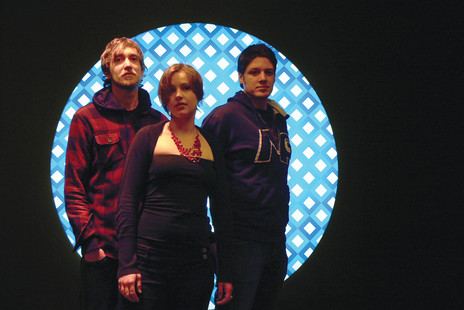
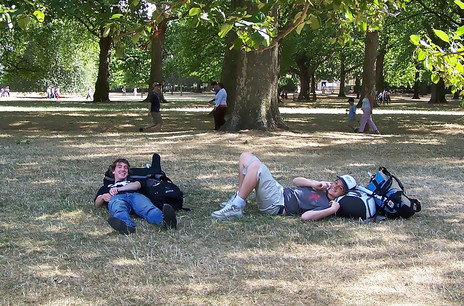
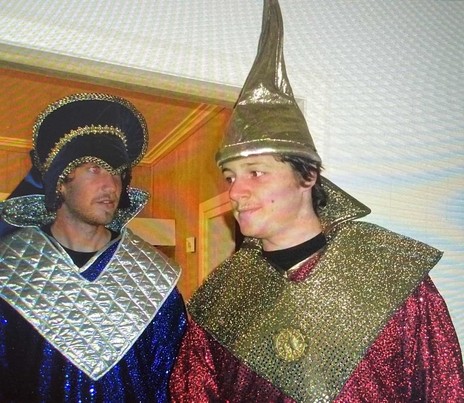
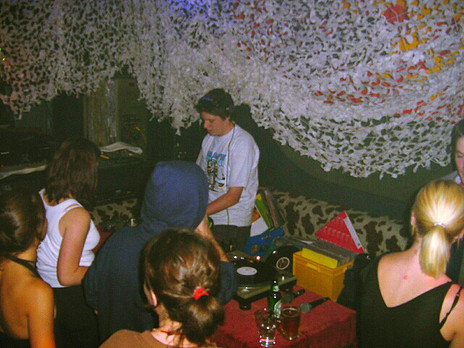
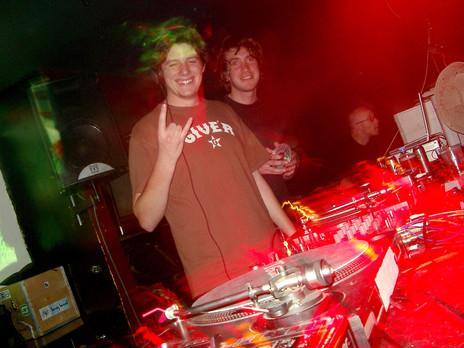
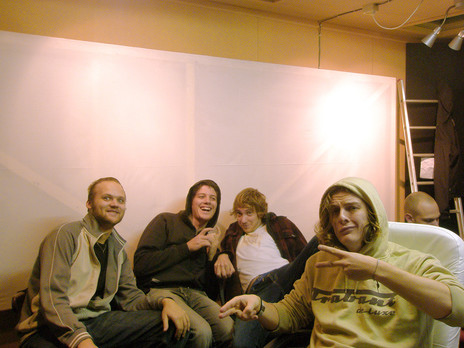
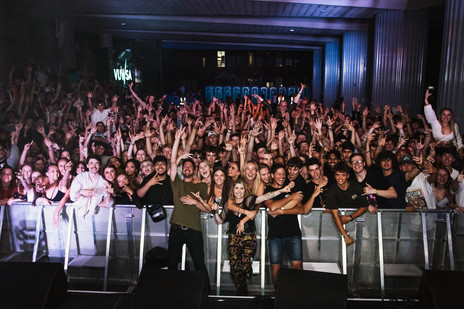
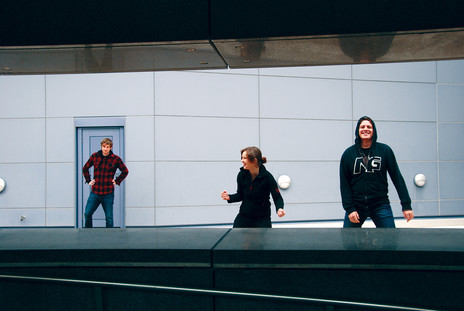
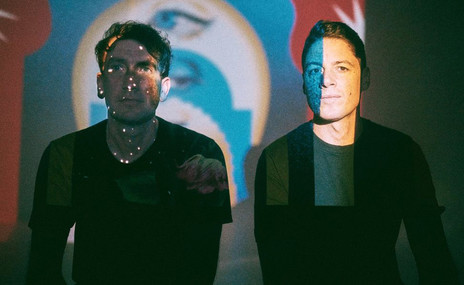
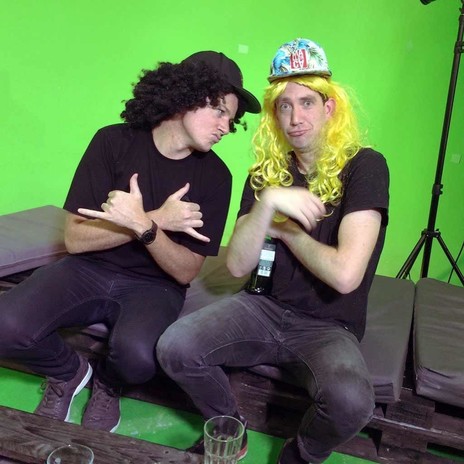
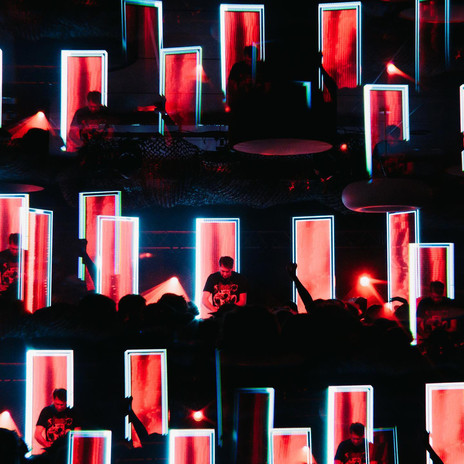
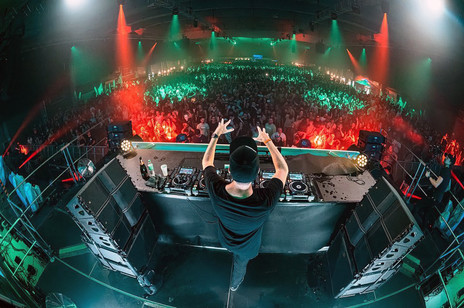
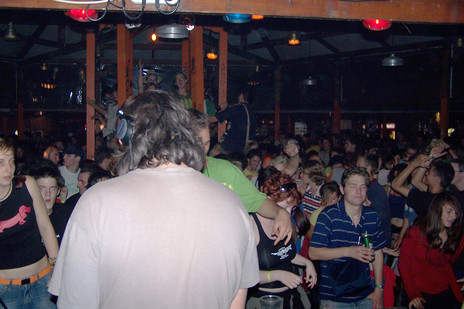
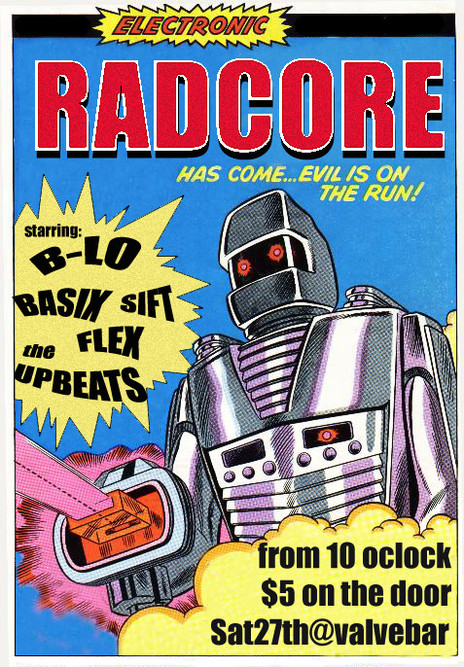
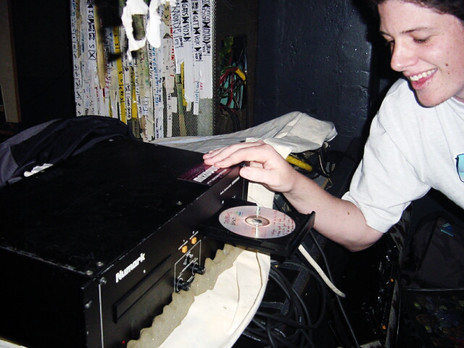
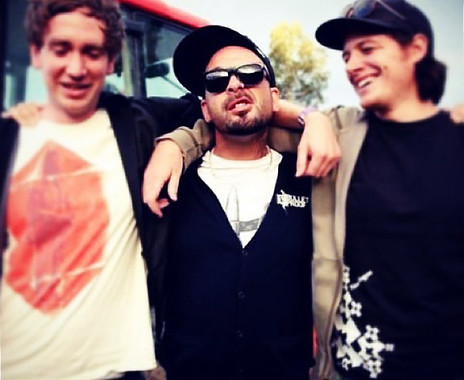
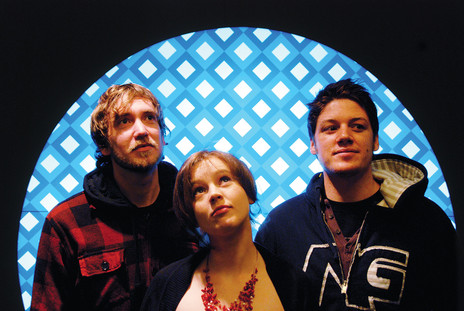
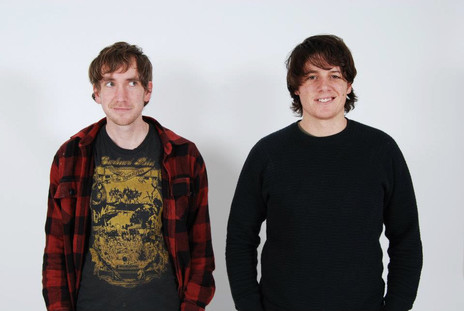
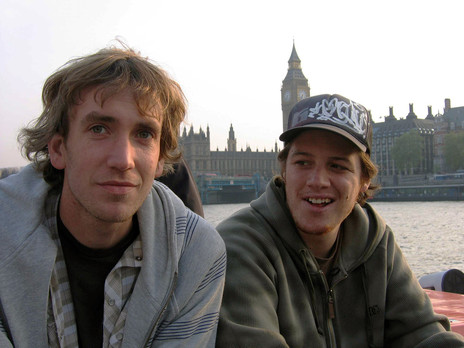
Fabel Music
BC Recordings
Vision Recordings
Non Vogue
Timeless Recordings
Vicious Music Group
Incite Recordings
Hostile Recordings
Protogen Recordings
Renegade Hardware
Subtronix Recordings
Virus Recordings
Soul:r
Subtitles
Samurai Music
Commercial Suicide
Visit our sister site
NZ On ScreenMade with funding from
NZ On Air


